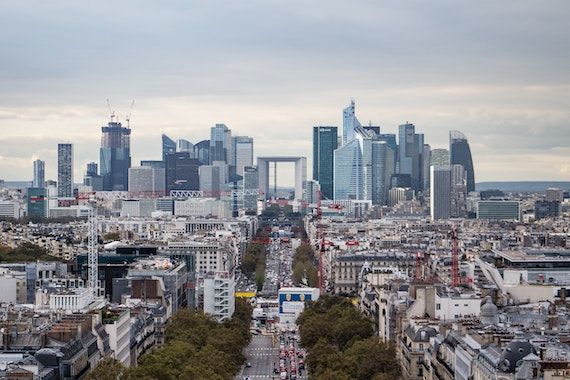La Defense district, Paris (Photo: Robin Christine for Unsplash)
to analyze. Very smart who can predict with certainty who will win the presidential elections in France in April. One thing is for sure, the biggest winner will be the re-industrialization of the country, because this is the one topic on which all candidates agree (along with Europe’s reaction to the Russian invasion of Ukraine), more on the left than on the right, but with different approaches.
This prospect is interesting for Canadian companies. This desire to increase the weight of the manufacturing sector in the French economy – about 10%, compared to 13.5% in Quebec and 26.5% in Germany – could represent important business opportunities, especially for equipment manufacturers.
That’s why this presidential election should be on our radar screen.
Barring a big surprise, outgoing President Emmanuel Macron – the centrist and leader of La République en Marche – should qualify for the second round, according to opinion polls published since the start of 2022 (his handling of the Ukraine crisis has boosted her popularity as well).
A possible duel between the center and the right The most likely scenario is that Emmanuel Macron faces a candidate from the right, because the left cannot field a prominent candidate, with the exception of the leader of rebellious France, Jean-Luc Mélenchon. Harris Interactive’s latest survey for Challenges Give him 12% of voting intent in the first round and he’s ahead.
Jean-Luc Mélenchon is not only behind Emmanuel Macron (24%), but is also behind right-wing Republican candidate Valérie Pécresse (13.5%) as well as two far-right candidates, Eric Zemmour (Reconquest) and Marine Le Pen. (National Rally), respectively received 15.5% and 17% of the vote.
There is a high probability that Emmanuel Macron will win the second round and win another term as President of France. Thus, according to simulations conducted by the newspaper “Daily” le Figaro (Based on data from NspPolls), Emmanuel Macron easily won duels against Valerie Pecres (55%, 45%), Eric Zemmour (62%, 38%) and Marine Le Pen (56%, 44%). After all, the victory of a right-wing candidate should not be ruled out given the history of the Fifth Republic, which was founded in 1958.
When a candidate from this political family can bridge the gap between the national bourgeoisie and the popular right, he can become president, as evidenced by the victory of Nicolas Sarkozy. Moreover, for Canadian companies, the identity of the future president is of little importance, because this person would not question the desire to re-industrialize France – it has become a bipartisan policy.
France is trying to re-industrial. This desire is not new, notes Florian Mainris, professor in the Department of Economics at ESG UQAM. Former Socialist President François Hollande tried to bring manufacturing jobs back to France, but without real success, this industrial policy specialist asserts.
However, the COVID-19 pandemic has heightened interest in re-industrialization in France, as political and economic leaders recognize the country’s reliance on strategic imports, starting with masks in 2020.
In October, President Macron announced a €30 billion ($43 billion Canadian) investment plan to re-manufacture France by 2030, in particular to increase production of electronics and secure the country’s supply of semi-drivers. Jean-Luc Melenchon suggests taxing imported products at EU borders that do not respect human rights and the environment, and often come from countries with low production costs.
For its part, Marine Le Pen wants the French state to provide a significant boost, for example by reducing employer contributions and exempting young entrepreneurs from taxes.
Minimal protectionism risk
Thierry Warren, professor in the international affairs department at HEC Montreal, believes that even if the winds of economic nationalism are blowing in France, Canadian companies shouldn’t have to worry about adopting protectionist measures. Since 2017, the Comprehensive Economic and Trade Agreement has facilitated trade between Canada and the European Union, and it will be difficult for France to unilaterally modify the terms of the agreement.
However, SPS rules are much stricter in Europe in the agri-food sector, and the European Union does not always recognize Canadian regulations, according to Groupe Export agroalimentaire Québec-Canada, the country’s largest agro-food exporters association.
Also, Canadian companies, which are already struggling to break into this sector in Europe and France, must remain vigilant, because the re-industrialization of the French economy can be based, among other things, on strengthening these rules.

“Subtly charming problem solver. Extreme tv enthusiast. Web scholar. Evil beer expert. Music nerd. Food junkie.”


